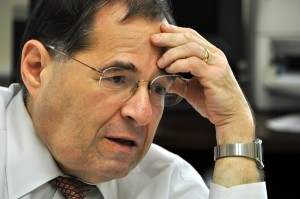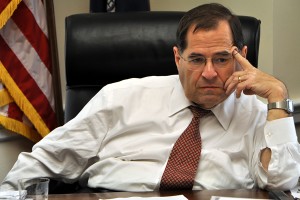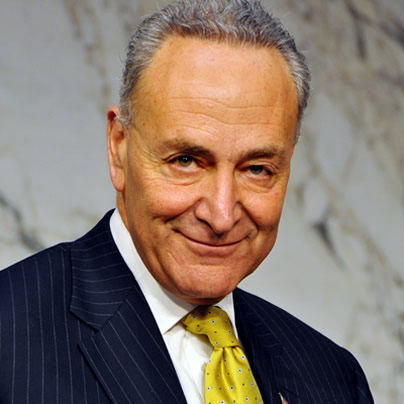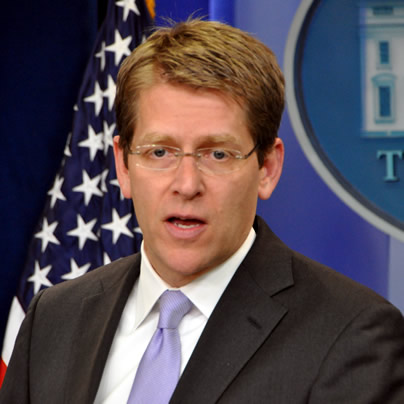National
No DOMA repeal next year: Nadler

Rep. Jerrold Nadler said the Respect for Marriage Act, which would overturn the Defense of Marriage Act, won’t pass next year. (DC Agenda photo by Michael Key)
The sponsor of a bill that would overturn the Defense of Marriage Act said repeal won’t happen in this Congress and that efforts next year will instead be focused on building support on the issue.
Rep. Jerrold Nadler (D-N.Y.) said in an interview with DC Agenda that lawmakers will work on passing other pro-LGBT bills next year, and could take up legislation to repeal DOMA — known as the Respect for Marriage Act — at the end of the two-year session starting in 2011.
“The Respect for Marriage Act is a bill that we can’t pass right now; we know we can’t pass it right now,” he said.
Nadler said Congress won’t take up the DOMA repeal next year because other LGBT-related bills, including the Employment Non-Discrimination Act, legislation providing partner benefits for LGBT federal workers and a repeal of “Don’t Ask, Don’t Tell,” are taking precedence. Supporters hope to pass those measures by the end of 2010.
“The Respect for Marriage Act comes up after that, maybe at the end of the next Congress, maybe afterward,” he said.
Nadler’s legislation would overturn DOMA, allowing the federal government to recognize same-sex marriages. It also has a “certainty provision” that would allow same-sex couples to marry in one state and still receive federal benefits even if they move to another state where gay nuptials aren’t recognized.
In lieu of passage in this Congress, Nadler said the task for supporters is to find more co-sponsors for the bill. As of Tuesday, the bill had 105 co-sponsors. Nadler predicted support would grow.
“And I think if some of these other bills pass, it’ll become more — the idea becomes less avant garde,” he said.
In response to Nadler’s remarks that a DOMA repeal won’t happen next year, Evan Wolfson, executive director of Freedom to Marry, said, “I don’t think we should begin the conversation about when it’s going to happen. I think we should begin the conversation with how do we build support and make it happen.”
“There are two ways to talk about our movement,” he said. “One is to talk about what it’s really about, to actually make the case for inclusion and fairness and freedom, to talk about why marriage matters. … The other is to spend all our time talking about the chess game or the political horse race, and we spend too much time on the latter and not enough time doing the former.”
Wolfson said supporters should begin the conversation “by each one of us calling our senators and member of Congress, asking them to sign on to the bill.”
Strategic decisions
Nadler’s prediction that a DOMA repeal won’t happen by the end of next year comes after other key potential supporters have said other LGBT legislation will be a priority.
At the time the Respect for Marriage Act was introduced in September, Drew Hammill, a spokesperson for House Speaker Nancy Pelosi, said the speaker is “focused on legislative items that we can enact into law now,” including ENDA.
And gay Rep. Barney Frank (D-Mass.) hasn’t signed on as a co-sponsor to Nadler’s bill, saying that lawmakers will instead focus on other LGBT issues this Congress and the bill’s certainty provision could cause political problems for House members seeking re-election.
Nadler said he hasn’t “had too many conversations” with Pelosi on the proposed DOMA repeal since it was introduced, but noted that the speaker has privately encouraged House members to co-sponsor the bill.
As for Frank, Nadler also said he hasn’t spoken much with the Massachusetts lawmaker on the issue since the bill’s introduction.
“We have a disagreement on the strategy on this obviously, as we had a disagreement on the strategy over the non-inclusive ENDA last [Congress] where we no longer have that disagreement,” he said. “And, I presume, in the end, we will not have a disagreement on this.”
Although supporters have said other bills will take priority this Congress, advocates for the DOMA repeal have hoped for congressional hearings on marriage by the end of next year.
But Nadler, who chairs a House Judiciary subcommittee with jurisdiction over marriage, said he wouldn’t commit to holding hearings on the issue by the end of next year and would hear only testimony “when we think it’s advantageous to do so.”
“And that’s a strategic decision, a tactical decision you have to make,” he said. “As things go on, we’ll have to see how things go. Right now, the thing is get the idea out there to get pressure built, to get more sponsors — and that’s the way to go.”
Asked whether Democratic leadership requested that he not hold hearings on marriage, Nadler replied, “No, they did not.”
Nadler said he expects a Senate companion to the Respect for Marriage Act would be introduced early next year, noting there are a number of potential sponsors for the Senate legislation.
Advocates have named Sen. Russ Feingold (D-Wisc.) as a prime target in talks because he chairs a Senate Judiciary subcommittee with jurisdiction over marriage. Nadler said Feingold would “possibly” champion the Senate legislation.
Nadler said a Senate bill has yet to emerge so many months after the House introduction in September because potential supporters have been occupied with other tasks.
“Some of the people we’re dealing with are very busy with a number of other things,” he said. “There’s not a sense of urgency, the sense that this bill has to have a Senate sponsor right now because it’s going to pass right now, because it’s not, so we’re talking.”
Even without a sense of urgency among lawmakers, Nadler said he thinks DOMA should be repealed because it’s “a stain on the national honor.”
“Even if you didn’t have a lot of practical effects, which obviously it does have, it’s wrong to keep such things on the books,” he said. “The honor of the country demands we repeal it.”
Same-sex marriage is only legal in five states throughout the country, but Nadler predicted that number would grow in coming years, and would include his home state of New York.
The Empire State was seen to be on the precipice of legalizing same-sex marriage, but the hopes of supporters were dashed last week when the state Senate killed a bill that would have granted marriage rights for same-sex couples. Nadler, who served in the New York Assembly for 16 years before being elected to Congress, said same-sex marriage will nonetheless be legalized in the state in a few years.
“I’d be very surprised if New York didn’t pass a gay marriage bill in the next two years, and I’ve been studying New York politics for 40 years,” he said. “And as long as we keep a Democratic governor and state Senate in the next election, we’ll get a gay marriage bill relatively soon in New York.”
As the number of states with same-sex marriage grow, Nadler said support for the Respect for Marriage Act also will build.
“Especially as a number of states have gay marriage, and the sky doesn’t fall in, and nobody comes in and busts up regular marriages — other than what’s busting up anyway — I think the issue will recede in the sense that people will lose their sense of the novelty,” he said.

Rep. Jerrold Nadler said of his home state that ‘as long as we keep a Democratic governor and state Senate in the next election, we’ll get a gay marriage bill relatively soon in New York.’ (DC Agenda photo by Michael Key)
Gay immigration bill could join reform debate
Another bill Nadler is championing in the House is the Uniting American Families Act, which would enable gay Americans to sponsor their foreign partners for residency. With an effort to pass comprehensive immigration reform expected in Congress next year, advocates are trying to include UAFA as a provision in the larger legislation.
Nadler said the White House seems to want to take on immigration reform in the spring and said UAFA supporters will “make a major thrust to make this part of the comprehensive immigration reform debate.”
The lawmakers drafting comprehensive immigration reform legislation are Rep. Zoe Lofgren (D-Calif.), Rep. Luis Gutierrez (D-Ill.) and Sen. Chuck Schumer (D-N.Y.). Nadler said it’s “hard to say” whether those bills would include a UAFA provision upon their introduction.
“There are a lot of cross pressures and we haven’t had those — we’ve started but we haven’t finished those conversations at this point,” he said.
But Steve Ralls, a spokesperson for Immigration Equality, said he’s “optimistic” immigration reform measures will include UAFA at their debut because supporters, including other lawmakers, immigration groups and LGBT groups, have been lobbying for an inclusive bill for some time.
“I don’t know what the final comprehensive immigration reform will look like, but I remain optimistic that it will include lesbian and gay families,” he said.
In the event that comprehensive immigration reform legislation doesn’t include UAFA when it debuts, Nadler said he’s working on making sure there are votes in the House Judiciary Committee to amend the bill to include such a provision.
Nadler said he’s “hopeful” there will be enough votes for an amendment, but added “that’ll be a big fight, if necessary.”
“I haven’t taken any votes or whip counts or done any kind of that work, but certainly it will be something that we’ll have to work at and the gay community and everybody will have to be pressuring the individual members of the committee,” Nadler said. “A lot of the members of the committee, the Democratic members especially, say they’re very great friends with the gay community … and this’ll be an opportunity to show that they are, bar none.”
One major obstacle that UAFA supporters will face is opposition from Catholic leaders. The U.S. Conference of Catholic Bishops has urged lawmakers to exclude the provision from immigration reform because church leaders support reform, but oppose the LGBT-specific provision.
Nadler said opposition to UAFA from Catholic leaders will make inclusion of the measure in the bill “a very difficult fight.”
“So, there will be some who will be tempted to say, ‘Wait a minute, let’s not alienate some of our major supporters on this legislation to pass it,’” he said. “There’ll be others of us saying, ‘Hey, no, if you’re doing a comprehensive bill, it’s got to be comprehensive. You can’t just leave certain people out.”
Even with opposition from Catholic leaders, Ralls said the list of religious groups who support the inclusion of UAFA in immigration reform “is very long and diverse,” and includes Quakers and Episcopalians.
“If the Conference of Catholic Bishops decides that they’re willing to throw the immigrant community under the bus because of the inclusion of LGBT couples, I think that would be a shame because, at the end of the day, immigration reform can help millions of families — both gay and straight — and that should be Congress’ priority.”
Asked whether he would support immigration reform legislation that doesn’t include a UAFA provision, Nadler replied, “I hope it doesn’t come to that.”
“All my efforts are designed to make sure it doesn’t come to that, so I’m not going to get into what happens at that point,” he said.
‘We will see a fair amount of action’
During his Agenda interview, Nadler also addressed arguments that the Obama administration and Congress haven’t made sufficient progress on LGBT issues since the start of this year.
The lawmaker said Congress has had a significant workload this year — including the passage of two annual budgets as well as stimulus and relief legislation for financial institutions — and that advocates for LGBT issues would be better to make judgments on Congress’ work at the end of next year.
“I think it would be very fair by the time the election rolls around next October to say we haven’t done enough on these issues,” he said. “I think a lot of things have been fermenting and cooking. I think we will see a fair amount of action on these issues in next year’s session.”
Asked whether President Obama could have spoken more forcefully on LGBT issues since the start of his administration, Nadler replied, “I think he could have been more forthright on some of them.” He declined to elaborate.
In response to recent criticism that lawmakers have been putting off action on ENDA, Nadler said some key supporters of the bill have been occupied with other issues. He noted the sponsor of the bill is Frank, who, as chair of the House Financial Services Committee, is also working on the Troubled Asset Relief Program legislation.
“Why aren’t we doing ENDA right now?” he said. “But what else are some of the key people doing? They’re over their heads with the financial reform, which no one anticipated six months ago. I suspect that once that is out of the way, which it should be soon, these kind of issues can come to the fore again.”
But John Aravosis, a gay blogger who has been leading an LGBT boycott of the Democratic National Committee, criticized the notion that Congress hasn’t acted on LGBT issues because lawmakers have been busy with other issues.
He said the Obama administration has found time to take swipes at the LGBT community by defending DOMA in court and, more recently, saying it couldn’t follow a court order from the Ninth Circuit judge to provide health benefits to the partner of a lesbian federal employee.
“It’s not enough just for them to say, ‘It’s been busy,’” he said. “Well, it hasn’t been busy — or so busy that they couldn’t take swipes at us.”
Aravois commended Nadler for being outspoken on LGBT issues, but questioned whether Nadler would criticize a Democratic Congress as a Democratic lawmaker, and whether Congress would, in fact, take up LGBT issues next year.
“Good luck passing gay rights legislation right before an election,” he said. “Democrats don’t have balls in off years — they certainly don’t have them right before elections, on gay issues especially.”
With regard to the LGBT legislation that Congress would take up next year, Nadler expressed uncertainty about the prediction that Congress would repeal “Don’t Ask, Don’t Tell” next year as part of the authorization bill for the fiscal year 2011 defense budget. Frank told the media last month that was the way he envisioned repeal.
But Nadler said repeal through the defense budget might not be the best way to overturn “Don’t Ask, Don’t Tell.” With the president calling for escalation of operations in Afghanistan, Nadler said such a provision would put more liberal members of Congress in a quandary over whether to vote for repeal and military operations at the same time.
“You don’t want to put people in the position of saying, ‘You vote against Afghanistan funding, you’re voting against [repealing] “Don’t Ask, Don’t Tell,”’ or vice-versa,” he said. “So maybe you need a new option or something. These are tactical considerations, which you have to look at as things unfold.”
Nadler said he, for example, didn’t “like this idea of sending more troops to Afghanistan,” although he supports a “Don’t Ask, Don’t Tell” repeal.
With public approval polls showing support waning for Democrats, Nadler predicted congressional Democrats will lose seats in the 2010 election, but added a hope that the party won’t lose “too many” seats. He noted that the November results would largely depend on how well the economy is faring.
Even with Democrats potentially in danger, Nadler said he didn’t think lawmakers would avoid LGBT issues next year to reduce a perceived risk of alienating voters before the election.
“I think we’re going to face most of these issues this Congress, mostly next year,” he said. “I’m assuming that the gay community is going to keep the pressure on. I mean, don’t go to sleep because I said it as that. If the gay community keeps the pressure on, then I think that, yes, we’ll probably face most of these issues.”
State Department
HIV/AIDS activists protest at State Department, demand full PEPFAR funding restoration
Black coffins placed in front of Harry S. Truman Building

Dozens of HIV/AIDS activists on Thursday gathered in front of the State Department and demanded the Trump-Vance administration fully restore President’s Emergency Plan for AIDS Relief funding.
Housing Works CEO Charles King, Health GAP Executive Director Asia Russell, Human Rights Campaign Senior Public Policy Advocate Matthew Rose, and others placed 206 black Styrofoam coffins in front of the State Department before the protest began.
King said more than an estimated 100,000 people with HIV/AIDS will die this year if PEPFAR funding is not fully restored.
“If we continue to not provide the PEPFAR funding to people living in low-income countries who are living with HIV or at risk, we are going to see millions and millions of deaths as well as millions of new infections,” added King.
Then-President George W. Bush in 2003 signed legislation that created PEPFAR.
The Trump-Vance administration in January froze nearly all U.S. foreign aid spending for at least 90 days. Secretary of State Marco Rubio later issued a waiver that allows the President’s Emergency Plan for AIDS relief and other “life-saving humanitarian assistance” programs to continue to operate during the freeze.
The Washington Blade has previously reported PEPFAR-funded programs in Kenya and other African countries have been forced to suspend services and even shut down because of a lack of U.S. funding. Two South African organizations — OUT LGBT Well-being and Access Chapter 2 — that received PEPFAR funding through the U.S. Agency for International Development and the Centers for Disease Control and Prevention in recent weeks closed down HIV-prevention programs and other services to men who have sex with men.
Rubio last month said 83 percent of USAID contracts have been cancelled. He noted the State Department will administer those that remain in place “more effectively.”
“PEPFAR represents the best of us, the dignity of our country, of our people, of our shared humanity,” said Rose.
Russell described Rubio as “ignorant and incompetent” and said “he should be fired.”
“What secretary of state in 90 days could dismantle what the brilliance of AIDS activism created side-by-side with George W. Bush? What kind of fool could do that? I’ll tell you who, the boss who sits in the Harry S. Truman Building, Marco Rubio,” said Russell.

U.S. Military/Pentagon
Pentagon urged to reverse Naval Academy book ban
Hundreds of titles discussing race, gender, and sexuality pulled from library shelves

Lambda Legal and the Legal Defense Fund issued a letter on Tuesday urging U.S. Defense Secretary Pete Hegseth to reverse course on a policy that led to the removal of 381 books from the Nimitz Library of the U.S. Naval Academy in Annapolis, Md.
Pursuant to President Donald Trump’s executive order 14190, “Ending Radical Indoctrination in K-12 Schooling,” the institution screened 900 titles to identify works promoting “diversity, equity, and inclusion,” removing those that concerned or touched upon “topics pertaining to the experiences of people of color, especially Black people, and/or LGBTQ people,” according to a press release from the civil rights organizations.
These included “I Know Why the Caged Bird Sings” by Maya Angelou, “Stone Fruit” by Lee Lai, “The Hate U Give” by Angie Thomas, “Lies My Teacher Told Me: Everything Your American History Textbook Got Wrong” by James W. Loewen, “Gender Queer: A Memoir” by Maia Kobabe, and “Democracy in Black: How Race Still Enslaves the American Soul” by Eddie S. Glaude, Jr.
The groups further noted that “the collection retained other books with messages and themes that privilege certain races and religions over others, including ‘The Clansman: A Historical Romance of the Ku Klux Klan’ by Thomas Dixon, Jr., ‘Mein Kampf’ by Adolf Hitler, and ‘Heart of Darkness’ by Joseph Conrad.
In their letter, Lambda Legal and LDF argued the books must be returned to circulation to preserve the “constitutional rights” of cadets at the institution, warning of the “danger” that comes with “censoring materials based on viewpoints disfavored by the current administration.”
“Such censorship is especially dangerous in an educational setting, where critical inquiry, intellectual diversity, and exposure to a wide array of perspectives are necessary to educate future citizen-leaders,” Lambda Legal Chief Legal Officer Jennifer C. Pizer and LDF Director of Strategic Initiatives Jin Hee Lee said in the press release.
Federal Government
White House sues Maine for refusing to comply with trans athlete ban
Lawsuit follows months-long conflict over school sports in state

The Justice Department is suing the state of Maine for refusing to comply with President Donald Trump’s executive order banning transgender athletes from participating in school sports, U.S. Attorney General Pam Bondi announced on Wednesday.
DOJ’s lawsuit accuses the state of violating Title IX rules barring sex discrimination, arguing that girls and women are disadvantaged in sports and deprived of opportunities like scholarships when they must compete against natal males, an interpretation of the statute that reverses course from how the law was enforced under the Biden-Harris administration.
“We tried to get Maine to comply” before filing the complaint, Bondi said during a news conference. She added the department is asking the court to “have the titles return to the young women who rightfully won these sports” and may also retroactively pull federal funding to the state for refusing to comply with the ban in the past.
Earlier this year, the attorney general sent letters to Maine, California, and Minnesota warning the blue states that the department “does not tolerate state officials who ignore federal law.”
According to the Maine Principals’ Association, only two trans high school-aged girls are competing statewide this year. Conclusions from research on the athletic performance of trans athletes vis-a-vis their cisgender counterparts have been mixed.
Trump critics and LGBTQ advocates maintain that efforts to enforce the ban can facilitate invasive gender policing to settle questions about an individual athlete’s birth sex, which puts all girls and women at risk. Others believe determinations about eligibility should be made not by the federal government but by school districts, states, and athletics associations.
Bondi’s announcement marked the latest escalation of a months-long feud between Trump and Maine, which began in February when the state’s Democratic governor, Janet Mills, declined to say she would enforce the ban.
Also on Wednesday, U.S. Education Secretary Linda McMahon said the findings from her department’s Title IX investigation into Maine schools — which, likewise, concerned their inclusion of trans student-athletes in competitive sports — was referred to DOJ.
Earlier this month, the Justice Department pulled $1.5 million in grants for Maine’s Department of Corrections because a trans woman was placed in a women’s correctional facility in violation of a different anti-trans executive order, while the U.S. Department of Agriculture paused the disbursement of funds supporting education programs in the state over its failure to comply with Title IX rules.
A federal court last week ordered USDA to unfreeze the money in a ruling that prohibits the agency from “terminating, freezing, or otherwise interfering with the state’s access to federal funds based on alleged Title IX violations without following the process required by federal statute.”
-

 District of Columbia5 days ago
District of Columbia5 days agoFinal push to raise funds, fill D.C. hotels as WorldPride nears
-

 El Salvador3 days ago
El Salvador3 days agoGay Venezuelan makeup artist remains in El Salvador mega prison
-

 District of Columbia4 days ago
District of Columbia4 days agoReenactment of 1965 gay rights protest at White House set for April 17
-

 Maryland5 days ago
Maryland5 days agoFreeState Justice: Transgender activist ‘hijacked’ Moore’s Transgender Day of Visibility event









